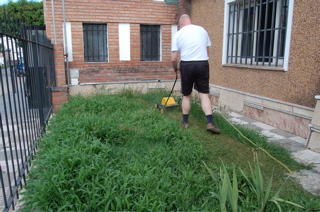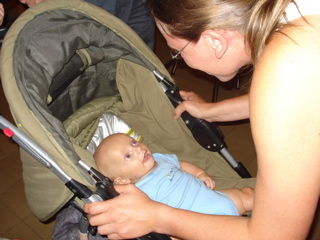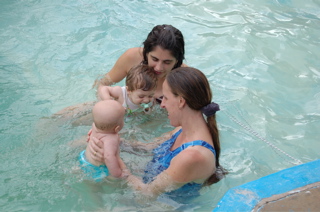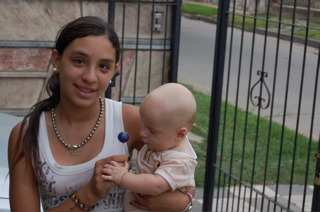 The intrepid missionary carves a swathe through the jungle.
The intrepid missionary carves a swathe through the jungle. Meaningful theological discussion in German
Meaningful theological discussion in German
 Comparing babies in the swimming pool…. ours is fatter and has less hair.
Comparing babies in the swimming pool…. ours is fatter and has less hair.
 Young friend Brenda introduces Joni to the major food groups.
Young friend Brenda introduces Joni to the major food groups.
Our Life in Argentina
 The intrepid missionary carves a swathe through the jungle.
The intrepid missionary carves a swathe through the jungle. Meaningful theological discussion in German
Meaningful theological discussion in German
 Comparing babies in the swimming pool…. ours is fatter and has less hair.
Comparing babies in the swimming pool…. ours is fatter and has less hair.
 Young friend Brenda introduces Joni to the major food groups.
Young friend Brenda introduces Joni to the major food groups.
When I was at All Nations (hesitate to say “studying”, although by all accounts I did more studying than my beloved by virtue of the fact that I actually wrote an essay or two…), on Wednesday mornings, we used to have a session known as CiM, “Contemporary Issues in Mission”. This was basically a “choose your own adventure” activity, where a case study would be presented, and students invited to come up with responses and solutions. A typical case-study would look something like this…
Case Study
A certain organisation, henceforth known as Mission-in-action, runs a short-term programme to place (mostly) young volunteers to work with national projects for a few months at a time. Over recent years the programme has grown, matured, and gained recognition and status both in the sending, and receiving countries.
Recently, a disturbing pattern appears to be emerging from a few projects, challenging Mission-in-action to respond, and maybe to rethink their modus operandi.
In general projects have tended to be fairly small scale, existing operations, characterised by a dynamic national leader, with experience, track record, a positive attitude to Westerners, and vision to move forward. As part of Mission-in-action’s relationship with the national leader, volunteers are seconded to the project to fulfill specific roles for an agreed period.
Over time, in some projects, relationships with the national leader have subtly changed for the worse, leading to a perception that the concepts of “partnership” and “project”, may have been given a lower priority than the personal ambition of the project leader. This has manifested itself in a variety of ways;volunteers feeling as though they are being exploited, in being asked to do more and more; or the prioritising of “fundraising” appearing to become the most important activity of the project, with volunteers being put under pressure to raise funds from their own friends and family. In some cases, this had resulted in relationship breakdown, and Mission-in-action declaring a moratorium on providing resources for a particular project or leader.
It has been suggested that there may be some parallels between a Western mission organisation finding themselves in a strained relationship with a national leader who has been enabled to construct themselves an empire; and a Western Government deciding to go to war against the dictator that they helped to put into power; “created by the CIA, wanted by the FBI”.
How could these situations have been prevented?
How should they be responded to?
Discuss with the person next to you, and be prepared to share your results by coffee time.
Two hypothetical scenarios…
or…
At what point does honesty step aside for the sake of ones quality of life?
How far do we really believe in democratic process?
We have just got back from our team conference in Buenos Aires, which was the best one I have been to so far. There were good people, we weren’t self-catering, we did a relaxed trip out to Tigre (on the delta of the BA coastline), there was nothing truly pointless on the programme, and I’m not pregnant! I accept it wasn’t the fault of the organisers that I was pregnant last year, but it does somewhat interfere with one’s enthuseasm for wading through relentless hours of pointless information.
Too busy to blog… ironies of life.
This week we went to San Marcos, and to San Francisco, and we’re about to go off to Buenos Aires for our annual team conference. In between, there have been trips to town, church meetings, various visitors both expected and otherwise, prison visiting, sundry appointments, cleaning, shopping, cooking, washing, entertaining Joni, and a man knocking a large hole into our kitchen wall in order to repair our burst hot-water pipe. He also fixed my oven; hooray hooray hooray. So I made chocolate brownies yesterday in celebration.
On Wednesday we went to look at the work that we have been offered in San Francisco. The road was full of trucks so it was slow going; three hours each way from Cordoba. We started with a meeting in the prison where the sub-directora wasn’t exactly delighted to see us; “ice-maiden” would be a fair description. Fortunately, another guy came along, whom I recognised as being the chief of security from one of the Cordoba prisons, now apparently transferred to San Francisco. When we started explaining about the ministry that Martin is involved with, the guy interrupted to say how well known and respected this ministry is in Cordoba, and the ice began to thaw.
We had lunch with some people on the leadership of the church; small baptist congregation, partners to the church in Cordoba. Then we went to visit the Rios family, who are good friends of ours. They have five kids who like playing with Joni.
Later, we went out to the village where we would probably be based. More of a hamlet than a village really. Surrounded by plantations, it takes five minutes to circumnavigate in a vehicle, and only slightly longer on foot. Although it is less than twenty kilometres from San Francisco, Quebracho Herreda seems to be a forgotten back-water with very few services or opportunities for its population and we managed to ascertain that there are no Christian activities going on at all. The idea of the project would be to work with families and kids with special educational needs. Many kids don’t go to school, others travel for hours in order to go to special schools in San Francisco, and still others attend the village school where the staff have neither resources nor understanding to respond adequately to individual requirements.
Ironically, the two most glaring needs that I could identify from a first visit are two things that I have always said I wouldn’t be getting involved with in Argentina! The first would be some sort of micro-enterprise project; high-tech farming techniques on huge plantations means that today there is little need for a low-skilled village workforce. The second would be to set up a Scout troop or something similar to provide some sort of structured activity to the pack of young kids hanging out in the plaza.
We probably won’t make any decisions until we are back in the UK and can put some distance between ourselves and the options, but there is certainly plenty to think about in the meantime.